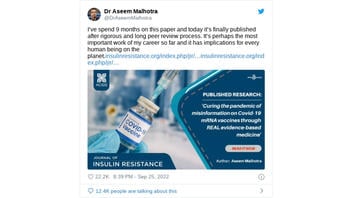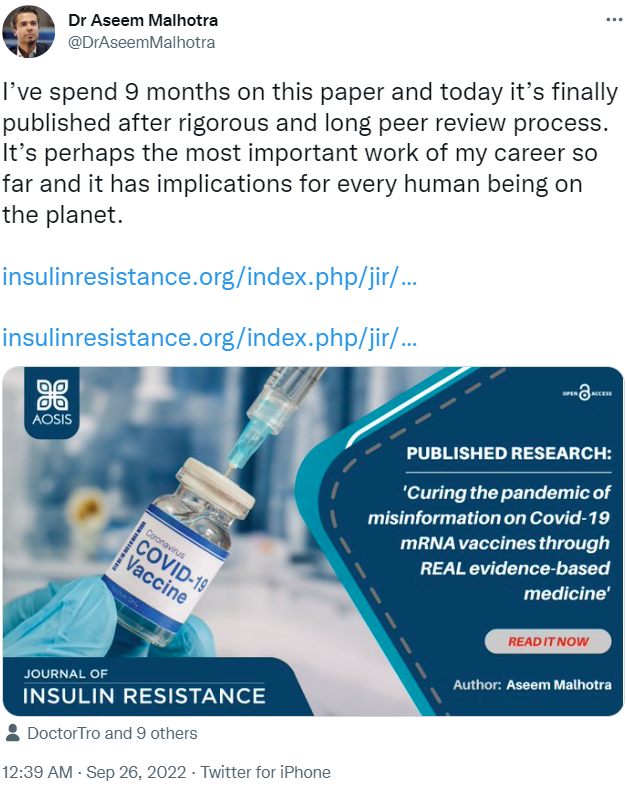Fact Check: MRNA COVID Vaccines Are NOT So Risky That Vaccinations Should Stop

Do mRNA COVID vaccines pose a significant health risk to recipients that warrants halting vaccination while global policies for COVID-19 are reappraised? Was insufficient testing performed on the vaccines prior to their public release? No, none of those are true: There’s no evidence that mRNA COVID vaccines are unsafe for the general population. A professor of epidemiology told Lead Stories in an October 5, 2022, email that “there is not enough scientific data to pause COVID vaccine administration, which has saved millions of lives.”
The claims appeared on September 26, 2022, in a tweet (archived here) by Dr. Aseem Malhotra, a British cardiologist and public health activist. The tweet linked to two of Malhotra’s recent papers, entitled “Curing the pandemic of misinformation on COVID-19 mRNA vaccines through real evidence-based medicine – Part 1” and “Curing the pandemic of misinformation on COVID-19 mRNA vaccines through real evidence-based medicine – Part 2.” It read:
I’ve spend 9 months on this paper and today it’s finally published after rigorous and long peer review process. It’s perhaps the most important work of my career so far and it has implications for every human being on the planet.
This is what the post looked like on Twitter at the time of the writing of this fact check:
(Source: Twitter screenshot taken on Wed Oct 5 17:31:09 2022 UTC)
The doctor’s papers
The tweet by Malhotra links to two COVID papers he published in late September 2022 in the Journal of Insulin Resistance, an open-access publication. While the journal is billed as “free open access,” publication expenses are offset by “charging Article Processing Charges (APC), also known as page fees, to authors, institutions or funders for each article published.” These are sometimes known as “pay-to-publish” schemes that give authors the appearance of being showcased in a respected journal.
In an October 5, 2022, email to Lead Stories, Catherine Troisi, an associate professor of epidemiology with the UTHealth Houston School of Public Health, said that she had issues with Malhotra’s papers from the start:
Published in the Journal of Insulin Resistance, which is not a relevant place to publish about COVID vaccines, and which has an impact factor of 0. This is not a reliable journal.
Dr. Robert D. Truog, the director of the Harvard Center for Bioethics, shared similar concerns in another October 5, 2022, email to Lead Stories. He wrote:
[T]he articles cited are in the Journal of Insulin Resistance. Their masthead claims that they are, ‘a clinically orientated journal covering advances in disorders of insulin resistance.’ Malhotra’s papers have absolutely nothing to do with insulin resistance. In each paper he has placed a single reference to insulin resistance as a throw-away line:
Paper #1: ‘We emphasised (sic) the fact that coronary artery disease is a chronic inflammatory condition that is exacerbated by insulin resistance’
Paper #2: ‘This article highlights the importance of addressing metabolic health to reduce chronic disease and that insulin resistance is also a major risk factor for poor outcomes from COVID-19’
These are the only references to insulin resistance made in the entire paper.
These are absurdly contrived throw-away lines to attempt to justify publication in this journal.
Troisi found shortcomings in the data Malhotra offered. She said:
Much of the information he presents are either ecological fallacies (failure in reasoning that arises when an inference is made about an individual based on aggregate data for a group. ), does not reach statistical significance or do not have control groups. He also, in the abstract, talks about data in the non-elderly population, but there are other risk groups as he admits in the contribution section of the abstract. One of the reasons we vaccinate is not just for individual risk reduction but community risk reduction to protect those at higher risk. He doesn’t discuss this.
In his papers, Malhotra argues that COVID vaccine testing was insufficient and the global vaccination program should be halted until more can be learned. Troisi said in her email that there’s nothing to support that approach:
- No, there is not enough scientific data to pause COVID vaccine administration, which has saved millions of lives.
- The author does not discuss the millions of deaths worldwide due to SARS-CoV-2 [coronavirus].
Centers for Disease Control and Prevention
Lead Stories asked the Centers for Disease Control and Prevention (CDC) for a response to Malhotra’s papers. In an October 5, 2022 email, spokesman Scott Pauley said that the “CDC does not comment on studies/findings that are not authored by CDC experts and conducted outside of the agency.” Pauley underlined that the CDC prioritizes COVID-19 vaccine safety and that it takes reported health problems with the vaccines “very seriously.” He provided a link for CDC vaccine-safety monitoring systems.
VAERS data
In the United States, VAERS provides data on adverse health events from vaccines. It is co-managed by the CDC and Food Drug Administration as a crude early warning system and not as a database for the quantification of specific outcomes.
Anyone with internet access can add a report to the VAERS list of reports. The public access link to it expressly warns against unwarranted conclusions based on VAERS material because the list only provides a tally of unverified notes about any health event people experience after they are vaccinated.
The list itself cannot be used to prove or quantify a claim since all it shows is a chronological correlation, not the causal link that would be more difficult to establish.
Risks vs. Benefits
The CDC has long said, “The benefits of COVID-19 vaccination outweigh the known and potential risks.” In his papers, Malhotra questions whether giving the mRNA COVID vaccines is ethical, especially for low-risk groups. Troisi sees no problem with it:
I’m not a bioethicist, but giving a vaccine that has been shown to save lives with no significant adverse events for most does not seem unethical to me.
Truog, who is a bioethicist, said Malhotra’s papers don’t meet professional muster:
[E]ach of the articles is nothing more than personal narratives that reflect the author’s biases.
Unfortunately, this is a classic example of how misinformation is spread under the guise of reputable medical publications.
Additional Lead Stories fact checks related to COVID vaccines can be found here.
This article has been archived for your research. The original version from Lead Stories can be found here.



